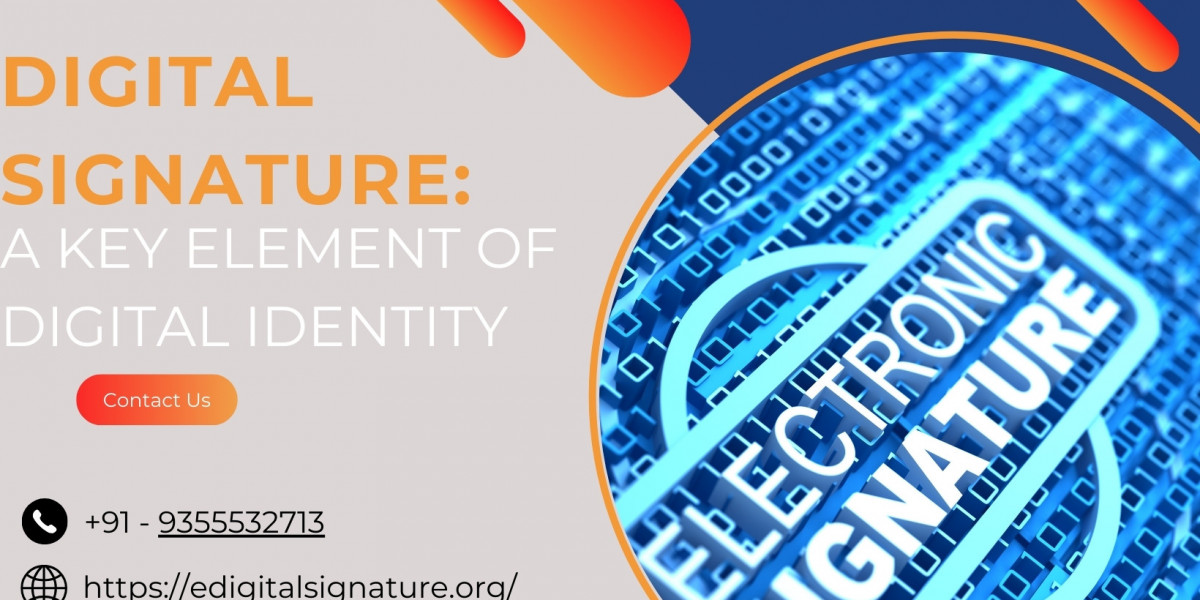In today's interconnected world, digital identity has become a cornerstone of online interactions, enabling secure and trusted exchanges of information across various sectors. As businesses, governments, and individuals continue to embrace digital platforms, the need for secure authentication mechanisms becomes paramount. Digital Signature, which is an integral part of this ecosystem, plays a crucial role in ensuring the authenticity, integrity, and non-repudiation of digital transactions. This article explores the significance of digital signatures as a fundamental element of digital identity, discussing their functionality, benefits, and applications in safeguarding online activities.
What is a Digital Signature?
A digital signature is a cryptographic technique used to validate the authenticity and integrity of digital messages or documents. It is a unique identifier that proves the origin of a document or transaction and ensures that the content has not been altered during transmission. Digital signatures are created using a private key, which is part of a public-key cryptography system. The private key is used to generate a signature, while the corresponding public key is used by recipients to verify its authenticity.
Digital signatures are akin to handwritten signatures but with far more robust security features. In contrast to traditional signatures, digital signatures are not just a representation of identity but also a means of ensuring that the signed data remains unmodified and authentic.
The Role of Digital Signatures in Digital Identity
Digital identity refers to the representation of an individual, organization, or device in the digital world. It comprises various attributes, including personal details, credentials, and biometric data, that verify someone's identity in online interactions. Digital signatures play a pivotal role in establishing and securing digital identities in the following ways:
1. Authentication of Identity
Authentication is the process of verifying the identity of a user or entity. Digital signatures serve as a robust method of authentication, providing proof that the individual or organization sending a message or document is indeed who they claim to be. When a document is signed with a digital signature, it is essentially tied to the identity of the signer through the use of cryptographic keys. Only the signer has access to their private key, which is used to create the signature, ensuring that the signature can only be associated with that individual or entity.
This authentication process eliminates the risks associated with impersonation, a common problem in digital interactions. For example, in the context of financial transactions or e-commerce, digital signatures confirm that the transaction has been initiated by a legitimate party, protecting both businesses and consumers from fraud.
2. Integrity and Non-repudiation
One of the core features of digital signatures is the guarantee of data integrity. When a digital signature is applied to a document, any alteration to the document after signing would render the signature invalid. This ensures that the signed content remains unchanged and can be trusted as an accurate reflection of the sender's original intentions.
Additionally, digital signatures provide non-repudiation, meaning the signer cannot deny having signed the document. This feature is particularly important in legal, financial, and contractual contexts, where parties must be held accountable for their actions. Non-repudiation is a powerful tool in resolving disputes, as it offers irrefutable evidence of the signer’s intent and consent.
3. Enhanced Security
In a digital environment rife with cyber threats such as hacking, phishing, and identity theft, security is a critical concern. Digital signatures contribute to the security of digital identity by using advanced encryption algorithms. Public-key cryptography, the foundation of digital signatures, ensures that only the intended recipient, who possesses the corresponding public key, can verify the authenticity of the signed data.
The private key used to create a digital signature is securely stored, often in a digital signature certificate (DSC) or hardware security module (HSM), making it resistant to theft or unauthorized use. This high level of security enhances trust in online interactions and prevents unauthorized access to sensitive information.
Process to apply for Digital Signature
Step 1: Visit the DSC Website
Begin by going to the official DSC website: https://edigitalsignature.org.
Step 2: Complete the Application Form
Fill in the required information in the application form. Key details to provide include:
User Type, Class Type, and Certificate Type: Choose the appropriate user type (individual, organization, etc.), the certificate class (typically Class 3 for security), and whether the certificate is for digital signing, encryption, or both.
Validity: Choose the desired validity period for your certificate.
Applicant Information: Provide your full name, contact number, email address, and residential address (including apartment number, city, state, and postal code).
Declaration: Carefully read the terms and conditions before proceeding.
Once the details are filled out, click Submit to proceed.
Step 3: Choose the Token Option
You will need a hardware token (a USB device used to store your private key). If you already own one, select “No” and your DSC will be downloaded onto the existing token. If you don't have a token, select “Yes” to purchase one.
Step 4: Payment for DSC
Proceed to make the payment for your DSC application. Payment options include online methods such as net banking, credit card, debit card, or UPI.
Step 5: DSC Issuance
After submitting the application and making the payment, your documents will be reviewed by the issuing authority. Upon approval, your DSC will be issued electronically. You will receive the DSC on a USB token via post.
The Legal and Regulatory Importance of Digital Signatures
In addition to providing security, digital signatures hold significant legal weight. Many countries have enacted laws and regulations that recognize the validity of digital signatures for legal purposes, such as signing contracts, filing taxes, and executing financial transactions.
1. Legal Recognition
Digital signatures are legally binding in several jurisdictions. In India, for example, the Information Technology Act, of 2000 (IT Act) recognizes the use of digital signatures in electronic commerce and legal documentation. Similarly, in the European Union, the eIDAS Regulation provides a legal framework for electronic identification and trust services, including digital signatures. These legal frameworks ensure that digital signatures have the same legal effect as handwritten signatures, fostering confidence in their use for official purposes.
2. Compliance with Global Standards
As global trade and transactions become increasingly digital, compliance with international standards is crucial. Many global organizations and governments require the use of digital signatures to ensure compliance with privacy regulations, such as the General Data Protection Regulation (GDPR) in Europe, or financial regulations like the Sarbanes-Oxley Act in the United States. Digital signatures are an effective means of adhering to these regulations, ensuring the secure handling of data and the legitimacy of online actions.
Applications of Digital Signatures in Digital Identity
Digital signatures are applied in a wide variety of fields, securing everything from personal data to financial transactions. Below are some of the key applications of digital signatures in supporting and safeguarding digital identities:
1. E-Government Services
Digital signatures are a cornerstone of e-government services, enabling secure and efficient online interactions between citizens and government agencies. From filing taxes to applying for permits, digital signatures ensure that these processes remain secure, transparent, and legally binding. Citizens can sign official documents digitally, ensuring their identity is authenticated without the need for physical presence.
2. Online Banking and Financial Services
Digital signatures are crucial in the banking and financial services industry. Whether it’s authorizing a bank transfer, signing a loan agreement, or verifying the authenticity of a credit card application, digital signatures ensure that transactions are legitimate and secure. In the digital banking ecosystem, where the risk of fraud is high, digital signatures provide an added layer of protection against unauthorized access and identity theft.
3. E-Commerce and Digital Contracts
E-commerce platforms rely heavily on digital signatures to authenticate transactions and ensure the integrity of contracts. When a consumer makes a purchase or signs a contract online, a digital signature guarantees that the transaction is legitimate and has not been tampered with. This creates a secure environment for both buyers and sellers, enhancing trust and preventing disputes.
4. Intellectual Property Protection
For creators and innovators, protecting intellectual property (IP) is of utmost importance. Digital signatures help protect copyrights, patents, trademarks, and other forms of IP by providing a secure way to verify ownership and timestamp original works. This is especially important in the digital age, where the risk of piracy and infringement is widespread.
5. Healthcare Industry
In the healthcare industry, the protection of personal health information is critical. Digital signatures are used to authenticate medical records, prescriptions, and other sensitive data, ensuring that the information remains confidential and tamper-proof. By incorporating digital signatures into healthcare systems, institutions can prevent unauthorized access to patient data and comply with privacy regulations like HIPAA (Health Insurance Portability and Accountability Act) in the United States.
The Future of Digital Signatures in Digital Identity
As digital interactions continue to proliferate, the role of digital signatures in digital identity will only become more prominent. Future developments in digital signature technology are expected to focus on improving usability, integration, and accessibility, making them easier to use across a wider range of devices and platforms.
1. Integration with Biometric Authentication
The future of digital signatures may involve deeper integration with biometric technologies such as fingerprint recognition, facial recognition, and voice authentication. Combining biometrics with digital signatures would provide an even higher level of security, ensuring that both the identity and the intent of the signer are verified.
2. Blockchain and Smart Contracts
Blockchain technology is poised to enhance the functionality of digital signatures, particularly in the realm of smart contracts. By integrating digital signatures with blockchain, it becomes possible to create self-executing contracts that are not only secure but also automatically enforced when certain conditions are met. This would streamline processes in industries such as real estate, finance, and supply chain management, reducing the need for intermediaries and improving efficiency.
Suggested read:- Class 3 Digital Signature.
Conclusion
Digital signatures are a fundamental component of digital identity, offering a secure, reliable, and legally recognized means of authenticating and protecting online transactions. As businesses and individuals increasingly rely on digital platforms for communication, commerce, and legal activities, the role of digital signatures will continue to grow in importance. By enhancing security, ensuring data integrity, and providing non-repudiation, digital signatures serve as a key element in building trust and confidence in the digital world. As technology advances, digital signatures will evolve to meet the needs of an ever-changing digital landscape, further strengthening their position as a cornerstone of digital identity.









